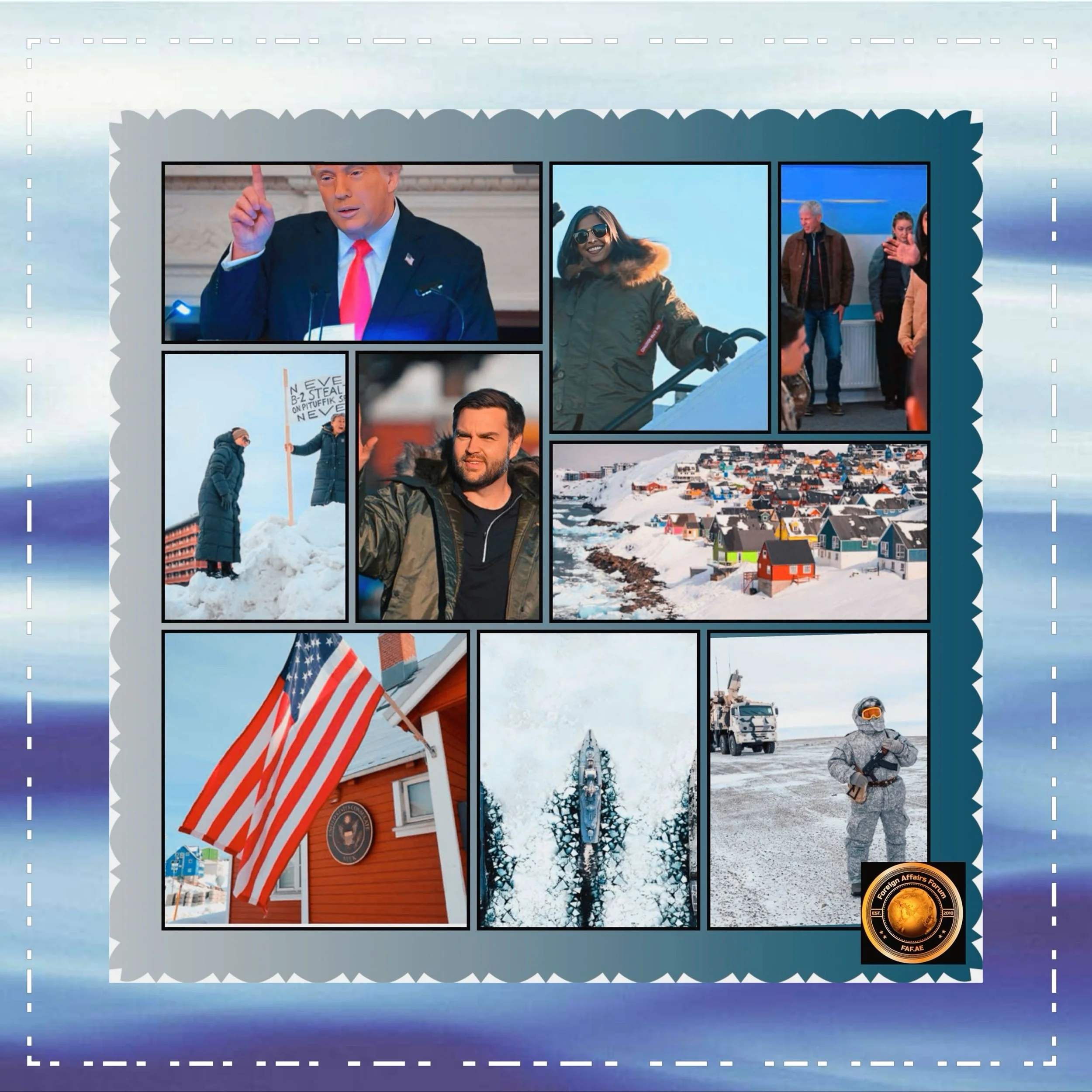Imperialism has no clothes : The Emperor’s New Greenland: Examining U.S. Imperial Ambitions in the Arctic
Introduction
The recent three-hour visit by Vice President JD Vance to Pituffik Space Base in Greenland exemplifies a concerning pattern of neo-imperial ambition wrapped in the thin fabric of national security rhetoric.
This brief expedition, occurring in the shadow of an embarrassing security breach and amid escalating tensions with Denmark, reveals much about the current administration’s approach to international relations and territorial expansion.
The Abbreviated Arctic Expedition
What began as a planned cultural visit featuring Second Lady Usha Vance attending a dog sled race transformed into a heavily restricted military base tour lasting mere hours.
This dramatic scaling back occurred after significant pushback from Greenlandic and Danish officials who were unconcerned about the delegation’s initial plans.
The brief excursion to this remote military installation, located approximately 930 miles from Nuuk (Greenland’s capital), allowed the U.S. delegation to avoid any actual interaction with Greenlandic citizens.
Upon arrival at the base, Vice President Vance immediately noted the frigid conditions, remarking, “It’s extremely cold here. No one informed me,” which elicited laughter from the military personnel present.
This light-hearted observation starkly contrasted the serious diplomatic tensions his visit had provoked. Despite having no experience with Greenland and spending only three hours in a controlled military environment, Vance made sweeping pronouncements about Denmark’s alleged failures toward the autonomous territory.
“You have under-invested in the people of Greenland and the security architecture of this incredible, beautiful landmass. That must change,” Vance told reporters at the U.S. military base.
He further claimed that Russia and China were increasingly interested in Greenland, suggesting that the territory would be better served “coming under the United States’ security umbrella than you have been under Denmark’s security umbrella.”
The Imperial Context
Vance’s visit represents just the latest chapter in the administration’s persistent campaign to gain control of Greenland.
Since his first term, President Donald Trump has repeatedly expressed his desire for U.S. ownership of the island, intensifying his efforts dramatically since his re-election.
In January 2025, Trump doubled down on this position, telling reporters, “I think Greenland is going to be something that maybe is in our future,” and claiming it was necessary for U.S. national security.
This rhetoric escalated further in March 2025, with Trump stating unequivocally, “We need Greenland for international safety and security. We need it. We have to have it”.
The president has refused to rule out using force to acquire the Danish territory, raising profound concerns throughout the international community.
Trump’s son, Donald Trump Jr., visited Greenland in January 2025, further underscoring the administration’s focus on the territory.
The historical parallels to classic imperial expansion are difficult to ignore. Greenland's approximately 57,000 people (mostly indigenous Inuit) are coveted primarily for its strategic location and abundant natural resources, including rare earth minerals and potential oil reserves.
This naked resource acquisition, cloaked in security justifications, follows a centuries-old pattern of powerful nations imposing their will on less powerful territories.
The Signal Scandal
The Greenland visit followed an embarrassing security breach that exposed troubling operational practices within the administration.
National Security Adviser Mike Waltz inadvertently added Jeffrey Goldberg, editor-in-chief of The Atlantic, to a Signal group chat that included Vice President Vance, Defense Secretary Pete Hegseth, and other high-ranking security officials discussing imminent military strikes in Yemen.
This breach revealed operational details and candid discussions among administration officials about planned military actions.
Vance reportedly expressed reservations about the strikes, writing, “I think we are making a mistake” and suggesting that the action served European interests more than American ones.
Goldberg observed the conversations for several days before exiting the chat and publishing details about the security lapse.
The incident raised serious concerns about the administration’s adherence to information security protocols, proper handling of sensitive military planning, and compliance with federal records laws.
Waltz later claimed to have never interacted with Goldberg, despite photographic evidence showing them together at a 2021 event.
International Fallout
The diplomatic consequences of the Greenland visit and the broader annexation rhetoric have been severe.
Danish Prime Minister Mette Frederiksen has repeatedly stated that “Greenland is not for sale” and emphasized that the territory belongs to its people.
Following Vance’s critical comments, Danish Foreign Minister Lars Løkke Rasmussen responded forcefully: “We are open to criticisms, but let me be completely honest, we do not appreciate the tone in which they are being delivered. This is not how you speak to your close allies.”
Greenland’s outgoing Prime Minister Mute Egede called the U.S. delegation visit a “provocation” and refused to meet with the group.
A recent poll revealed that most Greenlanders oppose any notion of annexation. The Greenlandic government did not invite the U.S. delegation and condemned the trip as “highly aggressive.”
Even Denmark’s monarch, King Frederik X, appeared to rebuke Trump’s offers in his first speech of 2025, stating, “We are all united and each of us committed to the kingdom of Denmark, from the Danish minority in South Schleswig and to Greenland.
We belong together”. The royal household also ordered a change to the Royal Arms of Denmark to include Greenland more prominently.
The Naked Truth of Empire
The administration’s approach to Greenland represents a troubling revival of naked imperial ambition in modern geopolitics.
The parallels to Andersen’s tale of “The Emperor’s New Clothes” are striking. The administration parades its security justifications and diplomatic maneuvers as though they constitute legitimate foreign policy, while the reality of attempted territorial acquisition through pressure and threats remains plainly visible to the world.
Russian President Vladimir Putin’s tacit support for U.S. claims over Greenland adds another disturbing dimension to this scenario.
Putin described U.S. intentions toward Greenland as “serious” and linked them to “long-standing historical roots,” potentially seeing benefit in disrupting Western alliances that would accompany any forced annexation.
Conclusion
The brief Pituffik Space Base visit amid ongoing security scandals and annexation rhetoric reveals a concerning pattern of behavior that undermines longstanding alliances and international norms.
Despite clear opposition from both Denmark and Greenlandic citizens, the administration's persistent claims on Greenland reflect an approach to international relations that prioritizes unilateral action and territorial acquisition over diplomatic partnership and respect for sovereignty.
As with the emperor in Andersen’s tale, the question remains whether enough voices will acknowledge the naked imperial ambition on display or whether diplomatic niceties and security justifications will continue to serve as illusory clothing for what appears to be an attempt at territorial expansion more reminiscent of the 19th century than the 21st.






